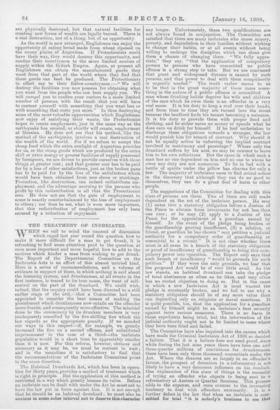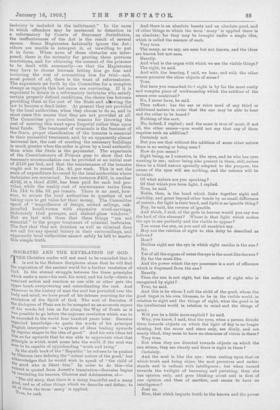THE TREATMENT OF INEBRIATES. Nv - HEN we call to mind the
amount of discussion which raged last year round the question how to make it more difficult for a man to get drunk, it is refreshing to find some attention paid to the question, at once more important and more hopeful, how to add to the motives which hinder a man from wishing to get drunk. The Report of the Departmental Committee on the Inebriates Acts is an effort of this almost untried kind. Here is a series of recommendations, and a volume of evidence in support of them, in which nothing is said about the licensing system, and drunkenness, at all events in the first instance, is traced to its true cause, the want of self- control on the part of the drunkard. We could wish, indeed, that the inquiry could have been directed to a still earlier stage of the evil,—that a Committee had been appointed to consider the best means of making the punishment which drunkenness now entails on the offender more drastic, and consequently more effective. The mischief done to the community by its drunken members is very inadequately remedied by the five-shilling fine which the law regards as the appropriate penalty. If we mended our ways in this respect—if, for example, we greatly increased the fine on a second offence, and substituted imprisonment in the case of a third—the inebriate population would in a short time be appreciably smaller than it is now. For this reform, however, obvious and necessary as it may be, we must be content to wait ; and in the meantime it is satisfactory to find that the recommendations of the Inebriates Committee point in the same direction.
The Habitual Drunkards Act, which has been in opera- tion for thirty years, provides a method of treatment which is right in principle. But the application of this method is restricted in a way which greatly lessens its value. Before an inebriate can be dealt with under the Act he must ask to have the law put in force against him. It is not enough that he should be an habitual drunkard; he must also be anxious in some sober interval not to deserve this character any longer. Unfortunately, these two qualifications are not always found in conjunction. The Committee are satisfied that there are many inebriates who cause misery, poverty, and degradation to their families without wishing to change their habits, or at all events without being willing to undergo the discipline which can alone give them a chance of changing them. "We fully appre- ciate," they say, "that the application of compulsory powers to persons who have committed no public offence is a strong step to take. But we are convinced that great and widespread distress is caused by such persons, and that power to deal with them compulsorily is urgently needed." The truth rather seems to us to be that in the great majority of these cases some- thing in the nature of a public offence is committed. A man whose drinking habits deprive his wife and children of the care which be owes them is an offender in a very real sense. It is his duty to keep a roof over their heads, and from time to time they are turned into the street because the landlord finds his tenant becoming a nuisance. It is his duty to provide them with proper food and clothing, and he either earns no money or spends what he does earn on drink for himself. If he had undertaken to discharge these obligations towards a stranger, the law would punish him for breach of contract. Why should it not be equally active in enforcing the implied contract involved in matrimony and parentage ? Where only the drunkard suffers by his acts, we may be content to leave him to his own reflections. But the cases in which such a man has no one dependent on him and no one to whom he owes any duty are not numerous. To lie in bed with a bottle of spirits under the pillow has charms for only a few. The majority of inebriates seem to find actual solace in the discovery that although they can do no good to themselves, they can do a great deal of harm to other people.
The suggestions of the Committee for dealing with this class of persons are three. Two of them are still made. dependent on the act of the inebriate person. He may (1) enter into a statutory obligation before a Justice of the Peace to abstain from intoxicants for not less than one year; or lie may (2) apply to a Justice of the Peace for the appointment of a guardian named by himself. In the event of the pledge being broken or the guardianship proving insufficient, (3) a relation, or friend, or guardian he has chosen" may petition a judicial authority for a compulsory order of guardianship or committal to a retreat." It is not clear whether there must in all cases be a breach of tha statutory obligation or proof of insufficiency of guardianship to bring this com- pulsory power into operation. The Report only says that such breach or insufficiency " would be grounds for such petition." If they were the only grounds, we fear that the proposed Act would be of very little avail. As the law stands, an habitual drunkard can take the pledge of total abstinence as often as he likes, and very often has no rooted objection to doing so. But in the cases in which a now Inebriates Act is most wanted the pledge is constantly broken, and we fail to see why a statutory obligation should be of any more value than one depending only on religious or moral sanctions. It is quite possible, too, that the application for a guardian named by himself might be an inebriate's best security against more serious measures. There is no harm in these expedients being tried, but the intervention of the judicial authority ought not to be limited to cases where they have been tried and failed.
The Committee have also inquired into the causes which have made the Criminal Inebriates Act of 1898 so decided a failure. That it is a failure does not need proof, since while during the last nine years there have been one and three-quarter millions of convictions for drunkenness, there have been only three thousand committals under the Act. Where the chances are so largely in an offender's favour, the prospect of detention in a reformatory is not likely to have a very deterrent, influence on his conduct. One explanation of this state of things is the necessity. of trying an offender who objects to being sent to a reformatory at Assizes or Quarter Sessions. This process adds to the expense, and runs counter to the increasing tendency to deal with offenders summarily. It is further defect in the law that when an inebriate is coin' milted for trial "it is nobody's business to see that inebriety is included in the indictment." In the cases in which offenders may be sentenced to detention in a reformatory by Courts of Summary Jurisdiction, the ineffectiveness of the Act is the result of several causes. Some Magistrates habitually ignore the Act; others are unable to interpret it, or unwilling to put it in force. When none of these obstacles are inter- posed, there is the neCessity for proving three previous convictions, and for obtaining the consent of the prisoner to be dealt with summarily—so • that the Magistrates may have to choose between letting him go free and incurring the cost of committing bun for trial—and, most potent of all, there is the want pf reformatories. The arguments set forth by the Committee for a complete change as regards this last cause are convincing. If it is expedient to detain in a reformatory inebriates who satisfy certain properly defined conditions, the choice lies between providing them at the cost of the State and allowing the law to become a dead-letter. At present they are provided by the local authorities, when they choose to do so, and in most cases this means that they are not provided at all. The Committee give excellent reasons for throwing the coat of meeting this want upon Imperial rather than upon local funds. The treatment of criminals is the business of the State, proper classification of the inmates is essential to their successful treatment, and, by an apparently almost universal law, the cost of erecting the necessary buildings is much greater when the order is given by a local authority than when the State is the paymaster. The experience of the Commissioners of Prisons goes to show that the necessary acconunodation can be provided at an initial cost of £150 per bed, and that the maintenance of the inmates ought not to exceed us. 4d. per week. This is not the scale of expenditure favoured by the local authorities where inebriates are concerned. In one instance £403, in another X542, in a third £596, has been paid for each bed pro- vided, while the weekly cost of maintenance varies from 15s. 11d. to 24s. 5d. per inmate. There is no need, how- ever, to accuse the local authorities in question of not taking care to get value for their money. The Committee speak of "magnificence of design, arched ceilings, oak- panelled board-rooms with expensive wood-carvings, elaborately tiled passages, and stained-glass windows." But we feel with them that these things "are not essential "to the proper treatment of criminal inebriates. The fact that they are drunken as well as criminal does not call for any special luxury in their surroundings, and apparently local authorities cannot safely be left to master this simple truth.





































 Previous page
Previous page